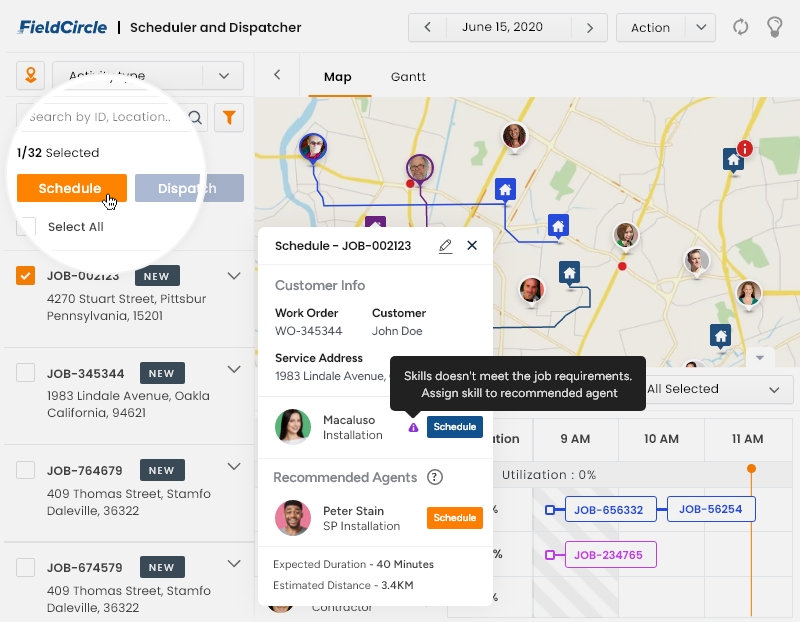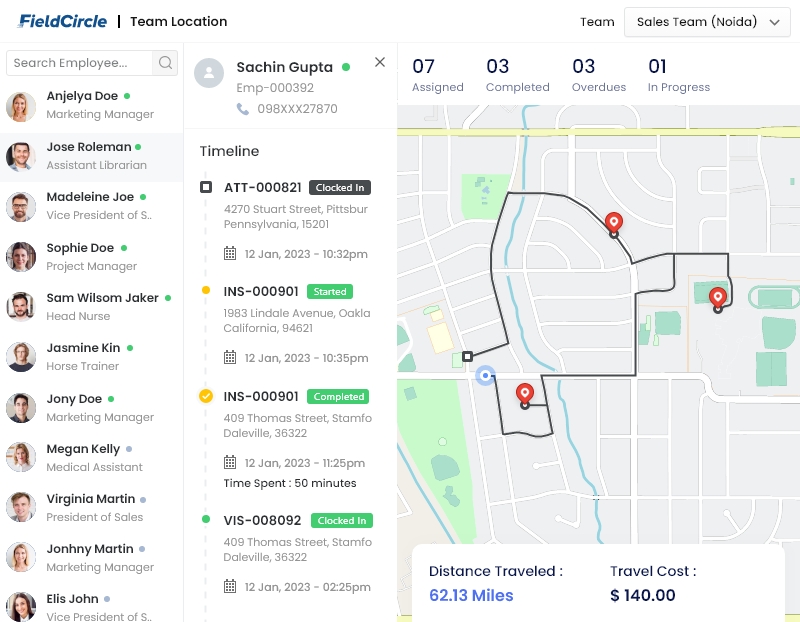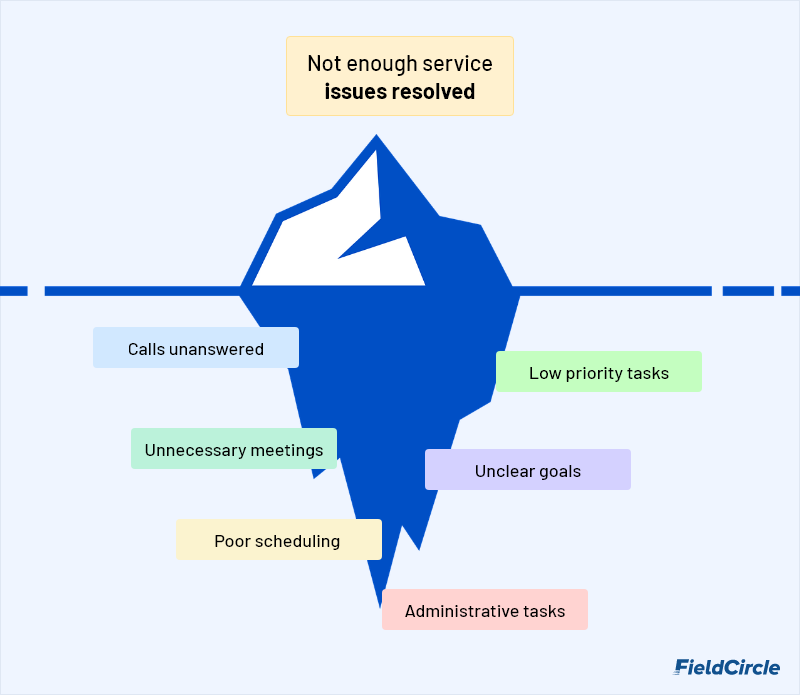10 Biggest Field Service Management Challenges and How Leaders Address Them

At some point in your business, you are bound to face challenges. How effectively you turn the challenges into opportunities to create a future that is—“better” determines your success in the market. For instance, if your current challenge is to get deep insights into service efficiency and techs’ performance, you have the opportunity to optimize the field service process and use a field service software and app that could help you get the relevant stats .
Is it possible to take advantage of every field service management challenge?
Well, a big yes!
But only if you know how to hit the nail on the head.
Field service management challenges are rife with opportunity. This is because there is never “enough” which could be done to optimize a service process. There will always be more room for innovation, customer satisfaction, increased efficiency, and higher service effectiveness.
Challenges ring the bell for “not being done enough” in certain areas. If you can effectively identify those areas and bridge the gaps, you could easily make way to a highly optimized field service process.
Here take a look at the top 10 field service management challenges faced by the companies.

Top 10 field service management challenges in detail and how you can use the challenges to your advantage and how you can take advantage of them to improve your field service process.
1. Scheduling Conflicts
Scheduling conflicts occur when two events hold the same slot on your field service representative calendar. If it is happening frequently, it could pose an existential threat to your field service business and so you must find a remedy immediately.
Mostly there are 3 types of scheduling conflicts, which are:
- Overlapping events: These happens when two events are scheduled in the same time slot.
- Double-booking: This happens when two field service representatives are booked for the same event.
- Unavailable time slot: This occurs when a field service rep is booked for a slot when the person is already engaged in another event.
Frequent conflicts could result in reputation damage or increased frustration among field service reps. Such results are axiomatic that the cost of service delivery has increased.
How have you decided to deal with this field service management challenges while taking advantage of the situation to improve your process?
What if along with preventing scheduling conflicts from the field service delivery process, you are also able to track and monitor on-site activities in real time?
In that case, the ideal scheduling model could be where you (in the office) schedule a technician on-the-fly and the technician (in the field) gets to know about his/her new schedule instantly.
Use this challenge as an opportunity to renovate your scheduling and dispatching process. Seek support in field service scheduling software and apps that alert you to potential conflicts and also help you create a set of backup reps for the same assignment.

Such apps also enable you to track and monitor time spent on visits so that you don’t schedule back-to-back shifts for reps as it could drain their full energy. And if the time spent on visits is lesser than expected, you can add more assignments to the calendar.
Manage Scheduling Conflicts
with FieldCircle
- Increase Profitability
- Reduce Costs
2. Travel Cost
Let us see how you can kill two birds with one shot—reduce the travel cost of your field service tech while increasing their productivity.
Well, there is one quick and easy way—to get visibility and control over the route planning process. When you know the existing and the next service location of your technician, you can guide them to take the best route for the visit.
Of course, the guidance is not based on your own judgment but on technology that recommends the best and safest route for any location.

Actually, you can kill a number of birds with this one shot (technology)—your technicians can use optimized routes to save time and cost, you can track and monitor in-the-field activity, and there will be less frustration and more visits for each technician if used correctly.
3. Work Order Management
Work order management challenges come in manifolds. If you are facing problems in work order management, it means various units in your field service business are at risk.
It indicates that most of the teams in your field service management process are facing problems in certain segments. The worst part is you will never really be able to find it out, unless you bring every disparate strand of the process together.
Let us try doing that here.
A work order in a field service business has 5 key phases:
- Identification of the task
- Allocation of the task
- Completion of the task
- Inspection of the task
- Recording of the task
In between these phases falls a number of tasks that must be completed on time and with quality to complete the work order.
For instance, the scheduling manager allocates the task to a field service rep, and then the rep (with the right skills and tools) reaches the client location at the right time to fix the issue.
As the success of the task depends on multiple factors, such as:
- Scheduling manager’s ability to select the right person for the job.
- A well-organized inventory having tools available to perform the task correctly.
- Rep’s availability for the scheduled tasks, including mode of transportation and the best route.
- Client’s availability
From point 2 to point 3 includes at least 4 key components that must be in place for your work order to reach to the next level. If any of these components is not functioning properly, for say, client’s availability has not been confirmed or the rep lacks the specific tool for the job, then the follow-up trips for the same job will be increased.
It will not only lengthen the work order management lifecycle but also increase the field service cost.
Similarly, from point 3 to point 4 includes a range of tasks that must be performed with certain efficiency to achieve success.
How would you keep a check on every task performed by every individual field sales representative? As in to do that you need real-time visibility into their every field activity.
Once you are able to track and record their movements, you can assess the recordings to find out the gaps in the processes and take adequate measures to mend them.
Also read: How Manufacturing Companies Can Improve Service Efficiency
4. Real-time Communication
Typically, field service managers rely on phone calls and messages to communicate with their representatives in the field.
But many of them have reported that often their workers are not in the network area or the job involves such minute detailing that it consumes a lot of time of staff in the office to keep them informed.
Does this field service management challenges resonate with you?
Usually, messaging applications on personal devices do not work in maintaining real-time communication with the team as it lacks accountability.
Every individual member of the field service team cannot be expected to use the device in the same way as the other. And to enforce certain standards on personal devices or applications is difficult for managers as employees might not want to comply with that.
The problem can be solved if you begin using customized software uniquely designed to help companies overcome such field service management challenges.
A field service management system usually has a web interface for office users and a mobile app interface for technicians in the field. The software is used as a mechanism to send, receive, and share information in real time between on-site field service technicians and executives in the office. And since it is official, you can create your own standards for communication and ensure its compliance.
5. Reduced Team Efficiency
How do you even know that your field service team’s efficiency is low?
Did you just feel like your field service technicians are wandering around instead of resolving client issues?
Or
It occurs to you that there are underlying efficiency issues that are affecting the team’s performance and ultimately the business performance?
Observing just above the surface scenarios will not help you determine who in the team is struggling with what challenges. You need tools that provide you visibility beneath the surface.

For instance, if your field service representative is not meeting daily targets, although it indicates an efficiency issue, the actual problem might lie in ineffective scheduling or routing or poor time management.
When you have visibility into the field service process, you are able to uncover those underlying problems that are causing inefficiency in the team.
6. Overhead Cost
All the effort you put into making your operations successful can go down the drain if you don’t reduce your overhead costs.
But can you actually reduce the overhead costs?
As for example, hiring talented technicians is necessary to deliver quality service but it increases the overhead cost.
No way you are going to compromise with the talent and that means technically you cannot actually reduce the cost. Only you can increase the ROI. The best way to increase the ROI here is by utilizing the resource efficiently and spending less on the new hiring.
A not so unique yet effective way to increase the ROI of overhead investments is to go online. Bring all your processes online.
The digital tools used to bring the field service processes online is part of overhead cost but its ROI will be high enough to maximize profitability and increase customer-satisfaction.
Let us assume your top 5 functions that increase overhead cost:
- Salaries
- Administrative costs
- Office supplies
- Utilities
- Accounting
When you manage these processes online in one place, you can look into areas where there is scope to optimize cost, increase the effectiveness and accuracy, and minimize the wastage of resources.
You get the opportunity to control the overhead costs and streamline your operations. Certainly a win-win situation.
7. Invoice and payment management
Missing invoices, lack of transparency, and no instant visibility into payments.
Sound familiar?
You have hired field service representatives for their technical skills, trained them on your product, and made them aware of your client’s challenges. And yet when they are actually doing what they have been hired for, you are still not able to maximize the ROI as they are messing up with the processes, which is technically not cut for their profile—managing invoices and payments.
As a field service business leader, you need to make the task easier for them. You have to reduce their burden of tallying and totaling, and create an environment where they can focus on what they are experts at.
Bring your invoice and payment management process on a single platform, and create online forms for invoices and payments which are simple and can be filled with just a swipe of a finger. Follow a pattern in that no crucial details are missed and track and analyze quotes, invoices, purchase orders, and payment details to avoid any discrepancies.
Choose off-the-shelf invoice and payment management software that supports online payment methods such as Braintree, PayPal, AuthorizeNet, Stripe, etc. so you can speed up the invoice creation and payment processes.
Also read: How Manufacturing Companies Can Improve Service Efficiency
8. Lack of validations
Who did what?
At what time?
With what tools?
Has the quality of the field service delivery been maintained?
Did the inspection manager follow the protocols?
Do these questions describe your field service management challenges?
Service quality improvements with regular inspection is common practice in the field service industry. However, there are two key aspects of service quality:
- The way customers perceive the quality of the service
- The quality level by the company to be achieved by field service reps.
Where the second point is objective in terms of attainability, the first point requires a statistical analysis of the second point plus a strategic approach to evolve the service-line with respect to the outcome of the analysis.
For instance, let us assume the following quality level has been set by your company, which must be achieved by every field service representative.
- Maximum complaint resolution time of 2 days
- The average time spent on each task should be 1.5 hours
- Completed status must be validated by the inspection manager
Assuming that these factors are the estimation of quality of the task performed, it must be ensured by the field service managers that every rep achieves and maintains these levels in each task. An analysis of these factors can help you determine the churn rates and customer satisfaction levels.
For the inspection manager to provide such validations is difficult if the task-related activities are being recorded on paper. Field service leaders need proof that tasks validated by them are authentic and 100% accurate.
Leverage digital tools that allow your field service reps to record check-in and check-out hours, and take a picture of the pre-task and post-task statuses so that inspection managers can validate the quality levels and you can track the statuses, anytime, anywhere to analyze the performance.
9. Opportunity assessment
At its core, field service management is about customer satisfaction.
The better you are able to capture your customer behavior, the more effectively you can garner customer satisfaction.
The whole point of customer satisfaction in the field service management sector zeros down to customer retention and cross-selling and up selling opportunities.
Beginning with analyzing customer behaviour, you need to have data to which you need to add the right context. For example, if your data signals an increase in customer churn rate, you need to add the context to such occurrences.
Possibilities are that your complaint resolution time is high or quality of service is not up to the expectations of the customers.
You can add a feedback system to your field service management software that allows field service representatives to record instant feedback from the clients. You can further evaluate feedback and straighten up your service-line to boost customer-satisfaction.
Now when you have a sorted list of happy and satisfied clients, you can actually plan on cross selling and up-selling opportunities. Roll out the plan to your reps and see the jump in revenue.
10. Uncertainty
Take a look back in 2019.
At any point of time throughout the year, have you imagined that the world is going to experience a pandemic that would lock people inside their houses, that roads would be deserted, that shops would be closed to never to be open again, and that people will have to choose between life and livelihood?
The previous “normal” has been disrupted and the new normal has been set. There is no guarantee that this “new normal” is forever and so it is necessary for the businesses to develop resilience to uncertainty.
Build a resilient field service business.
Explore how you can leverage technology, people, and processes that can withstand the disruption caused by uncertainty.
- People- Build a team whose productivity and efficiency remain unfazed when a problem occurs.
- Process-Accommodate a variety of situations while designing processes.
- Technology-use technology to develop omnipresence, regardless of what may happen.
How do these top 10 field service management challenges resonate with you?
FieldCircle can help you overcome these challenges with ease, ensuring that your business advances to the next level of success. We have successfully empowered YourSpace, Dentalkart, EventGraphia, and others to increase efficiency up to 30% of their field representatives and revenue by 35%.
Transform Your Field
Service Operations
- Increase Profitability
- Reduce Costs


